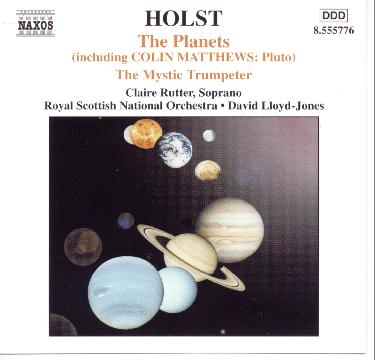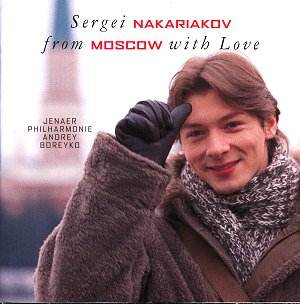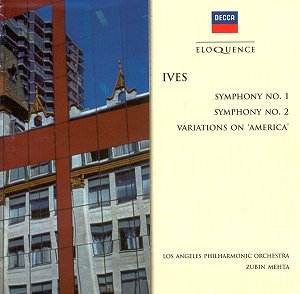 Composer: Gustav Holst
Composer: Gustav Holst
Works: The Planets, The Mystic Trumpeter (ed. Colin Matthews and Imogen Holst)
Performers: Claire Rutter (soprano), Ladies of the RSNO Chorus, Royal Scottish National Orchestra, conducted by David Lloyd-Jones
Recording: Surround Sound in City Halls Glasgow, 17-18 February 2001
Label: NAXOS
Gustav Holst’s oeuvre remains a cornerstone of early 20th-century British music, characterized by an imaginative orchestral palette and a penchant for cosmic themes. His most famous work, The Planets, composed between 1914 and 1917, explores the astrological influences of the planets in a series of vivid character sketches. This Naxos recording not only presents The Planets with the addition of Colin Matthews’ Pluto, The Renewer, but also includes The Mystic Trumpeter, an early work that hints at Holst’s evolving style. This release serves as both a celebration of Holst’s legacy and a reminder of the wealth of his lesser-known compositions.
David Lloyd-Jones leads the Royal Scottish National Orchestra with a solid yet occasionally uneven interpretation of The Planets. The orchestral execution is commendable, particularly in Mars, The Bringer of War, where the visceral impact of the opening measures is palpable. However, while the tempo choices in Mars emphasize urgency, they risk sacrificing the ominous grandeur that is crucial to Holst’s vision of impending conflict. The brass section commands attention, particularly in the driving rhythms, yet the interpretation sometimes leans too heavily into the frenetic, glossing over the underlying tension that should feel inevitable rather than relentless. In contrast, Venus, The Bringer of Peace is rendered with a shimmering beauty that captures the ethereal qualities of Holst’s writing, with the strings achieving a silken texture that underpins the movement’s serenity.
The recording quality stands out, with remarkable clarity and depth, especially in the surround sound format. The engineers have managed to capture the full dynamic range of the orchestra, allowing the listener to experience the dramatic contrasts inherent in Holst’s writing. However, the engineering can feel excessively wide at times; the orchestral texture in Neptune, The Mystic loses a degree of intimacy as the ethereal chorus emerges. The ladies of the RSNO Chorus contribute a haunting quality to the final movement, yet their efforts appear somewhat strained, diminishing the mystique that Holst intended.
The Mystic Trumpeter, composed in 1904, showcases an early glimpse of Holst’s mastery in orchestration and thematic development. Here, the influence of Wagner is palpable, particularly in the robust treatment of the brass, which heralds the thematic material with a sense of gravitas befitting the Whitman text. Claire Rutter’s soprano performance is notable for its ambitious range, although her higher notes occasionally edge towards shrillness, detracting from the overall emotional impact of the piece. Despite this, her interpretation captures the ecstatic spirit of the text, particularly during the climactic proclamations, where she adeptly navigates Holst’s intricate melodic lines.
Colin Matthews’ Pluto serves as a fitting modern companion to Holst’s original suite, taking us into the icy realms of the newly discovered planet. Matthews incorporates thematic material from Mars, creating a seamless connection that enriches the thematic continuity of the entire cycle. His orchestration offers a more forbidding soundscape, introducing a more contemporary language that contrasts effectively with Holst’s early 20th-century idiom. The climactic moments resonate with a palpable tension, although the abrupt re-entry of the chorus may feel slightly contrived upon initial listenings.
This recording of The Planets and The Mystic Trumpeter presents a robust interpretation that adheres to Holst’s distinctive voice while integrating modern elements through Matthews’ Pluto. Although certain interpretative choices may not fully capture the profound depths of Holst’s mysticism, the performance is distinguished by its orchestral strength and the high-quality sound engineering that Naxos has delivered. The inclusion of The Mystic Trumpeter adds significant value, offering listeners an engaging glimpse into Holst’s formative years, making this a commendable addition to the recorded canon of Holst’s works.



